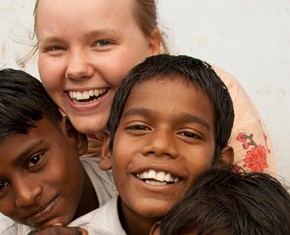The views expressed in our content reflect individual perspectives and do not represent the authoritative views of the Baha'i Faith.
Other attributes of perfection are to fear God, to love God by loving His servants, to exercise mildness and forbearance and calm, to be sincere, amenable, clement and compassionate; to have resolution and courage, trustworthiness and energy, to strive and struggle, to be generous, loyal, without malice, to have zeal and a sense of honor, to be high-minded and magnanimous, and to have regard for the rights of others. – Abdu’l-Baha, The Secret of Divine Civilization, p. 40.
“Affection” is the name of the 15th year of the Baha’i cycle of 19 years.
But is affection really an “attribute of God”? Or a “Name of God”? If so, how so? What is affection — beyond the ordinary usage of the word? What does affection mean — in a spiritual sense?
The original word for Affection, in Arabic, is Widad (Persian: Vidad). This word, with its numeric value of 15, fits perfectly as a spiritual name for the 15th year of the Baha’i cycle of 19 years.
Truth be told, there has not been a lot of attention drawn to these Baha’i years in the practical use of the Baha’i Calendar. But the attributes of God themselves invite reflection, especially those that are less familiar. How can we best understand the divine quality of affection in its full and most profound sense?
Here’s one way to begin. Consider this analogy: To understand the words of Jesus, it is helpful to look to the Hebrew Scriptures (what Christians call the “Old Testament”). Similarly, to understand the words of the Bab, Baha’u’llah or Abdu’l-Baha—the Central Figures of the Baha’i Faith—the Islamic background provides a key context. This does not mean that Baha’is are Muslims. Muslims are Muslims. Baha’is are Baha’is. Yet the Baha’i Faith has Islamic roots, like Christianity has Jewish roots.
A form of the Arabic word for “affection” is found in the Qur’an, the holy book of Islam:
Indeed, those who have believed and done righteous deeds — the Most Merciful will appoint for them affection. – Qur’an 19:96
“The Affectionate” is an attribute of God, here used as an adjective and then a noun in the Quran:
And ask forgiveness of your Lord and then repent to Him. Indeed, my Lord is Merciful and Affectionate. – Ibid., 11:90.
And He is the Forgiving, the Affectionate. – Ibid., 85:14.
And so, over time, “the Most Affectionate” (al-Wadud) became widely regarded as the 47th or 48th of the “Ninety-Nine Names of God” in classical Islam.
We can find that quality in the human experience of God. Simply put, when we appreciate the “good things of life” that we receive as a bounty and blessing from God, it feels like love and affection.
When we understand that God is the source of all bounty and blessing, then we experience God in a way similar to that of the child who basks in the love and affection of a good mother or father. Even hardships, which Baha’is often call “tests,” can be seen as blessings from God. These difficult life experiences, in a good and positive way, can test our “mettle and fettle,” so that we can become stronger and more spiritual as a result.
We all know about affection as fondness. Sometimes “affection” is expressed in a gentle way, as in a caress. We often associate affection in a romantic context. At other times, affection may be expressive of friendship, or loyalty to “kith and kin.”
But how does “affection” relate to godly perfections and goodly actions? One clue is “to love God by loving His servants,” as in the opening quote.
Many readers know that the Bab (1819 – 1850) was the forerunner of Baha’u’llah (1817 – 1892), the prophet-founder of the Baha’i Faith. Besides preparing the way for the advent of Baha’u’llah, the Bab revealed his own scriptures, including one called the “Book of Divine Names.”
According to Nader Saiedi, Taslimi Professor of Baha’i Studies in the Department of Near Eastern Languages and Cultures at UCLA, the Bab’s Book of Divine Names is “more than three thousand pages” in length and is “the largest revealed book in sacred history” (Saiedi, Gate of the Heart, p. 36).
The Book of Divine Names discusses—at length, in detail, and with examples and profound insights—how we, as human beings and as spiritual creatures, can reflect divine names and attributes. According to Saiedi:
In the Kitabu’l-Asma, interpreting the name of God, the Most Peaceful (Aslam) the Bab singles out gentleness toward all things as the most exalted deed. He prohibits rage and wrath and commands the Babis to act, in all the material and spiritual aspects of life, with the utmost consideration and courtesy, so that no one will be saddened by them. – Saiedi, Gate of the Heart, p. 323.
Professor Saiedi then translates this further explanation by the Bab:
Be lovingly watchful of one another and thus improve your affairs. Should ye find amongst you one who is afflicted with grief, remove his sorrow by any means in your power, and should ye find one stricken with poverty, enrich him to the extent of your ability. If ye find in your midst one who is abased, exalt him to the extent ye can, and if ye find one who is veiled by ignorance, educate him to the degree of your capacity. Should ye find amongst yourselves one who is single, help him to marry, in accordance with the divine law, to the limits of your ability, and should ye find one who is in distress, bring him tranquility by any means in your power. . . . Gaze upon others with the same eyes with which ye gaze upon your own selves. . . . If ye find in your midst one who is hungry, send him, in truth and to the extent of your power, food in such a way that his heart will not be saddened, and if ye find one who has no clothes, provide him with clothes in the most dignified manner, to the extent possible for you. Look then not at your selves and your possessions, but rather look at God, Who hath created you and conferred upon you from His kingdom that which is your lot. – Provisional translation by Saiedi, Ibid.
With this wise counsel from the Bab in mind, think about taking time out as a “time for affection” in order to “love God by loving His servants.” The rest is up to you!
















Comments
Sign in or create an account
Continue with Googleor